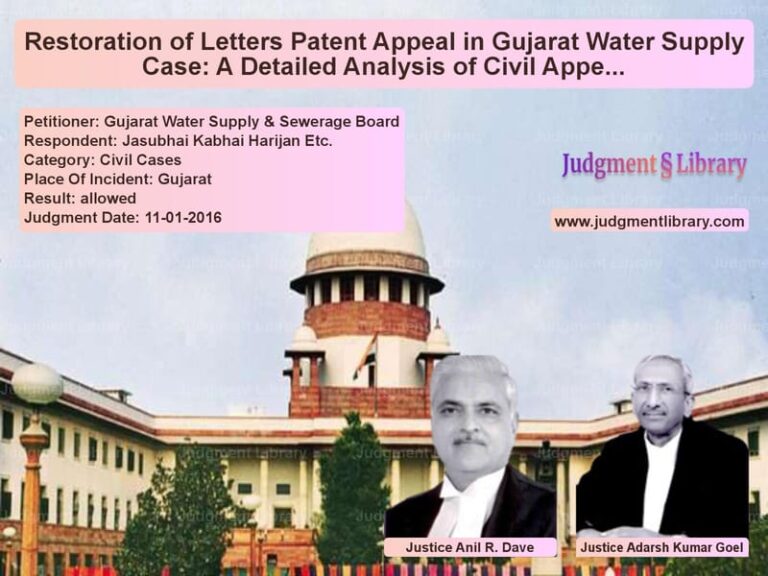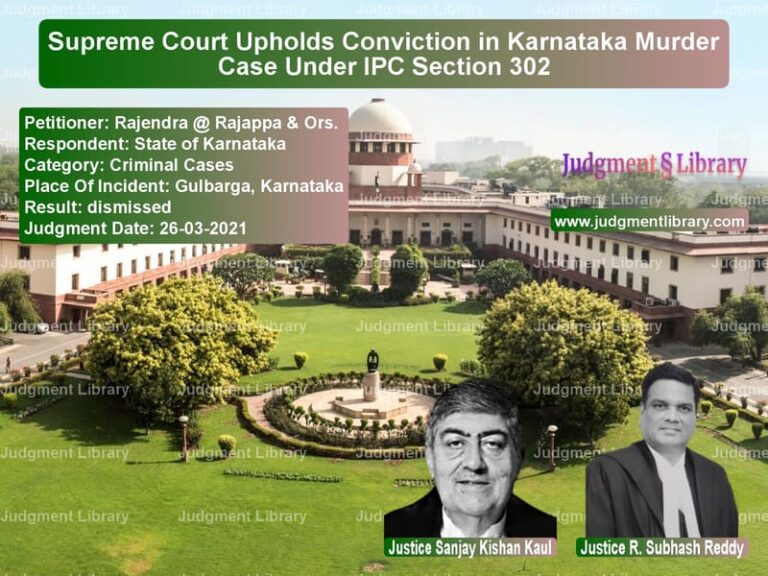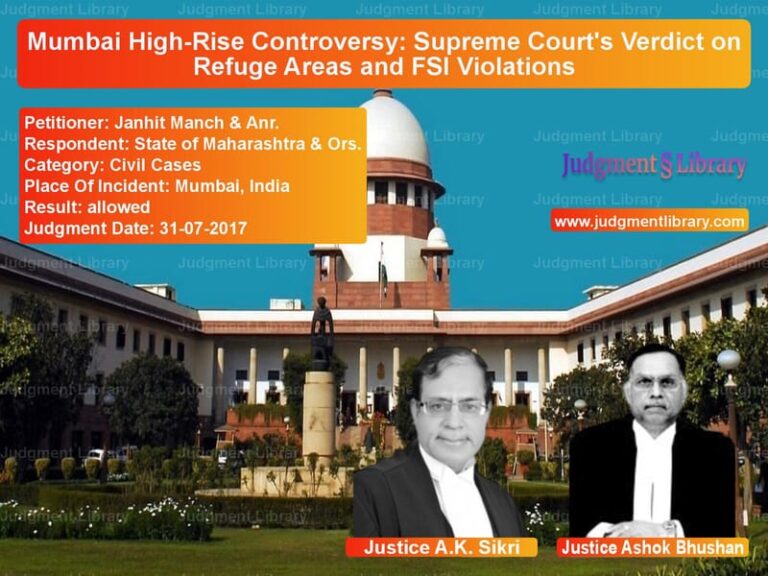Supreme Court Upholds Rajasthan’s Electricity Open Access Regulations – Key Takeaways
In a significant judgment delivered on April 1, 2025, the Supreme Court of India dismissed appeals challenging the validity of the Rajasthan Electricity Regulatory Commission (Terms and Conditions for Open Access) Regulations, 2016. The case, titled Ramayana Ispat Pvt. Ltd. and Anr. vs. State of Rajasthan & Ors., revolved around the restrictions imposed by the Rajasthan Electricity Regulatory Commission (RERC) on open access for captive power plants and other large consumers of electricity. The Court upheld the High Court’s decision, affirming that the regulations were within the RERC’s jurisdiction and served the larger public interest by ensuring grid stability and fair competition in the electricity market.
Background of the Case
The appellants, primarily industrial consumers and captive power generators, challenged two separate orders passed by the High Court of Rajasthan—one by the Jodhpur Bench dated August 29, 2016, and the other by the Jaipur Bench dated September 6, 2016. The appeals arose from challenges to the validity of the RERC’s 2016 Regulations, which imposed restrictions on the exercise of open access for captive power plants and other large consumers. The appellants argued that these restrictions were arbitrary, unreasonable, and contrary to the statutory scheme of the Electricity Act, 2003.
Key Issues Before the Supreme Court
- Whether the RERC had the jurisdiction to regulate inter-state open access under the Electricity Act, 2003?
- Whether the imposition of penalties for variations in drawal from contracted demand amounted to an unreasonable restriction on the right to open access under Section 42 of the Electricity Act, 2003?
- Whether Regulation 26(7) was ultra vires for requiring an advance notice of 24 hours, thereby preventing urgent procurement and creating an artificial barrier to open access?
- Whether Regulation 21 was arbitrary and discriminatory, discouraging captive power generation by creating unreasonable distinctions between CPPs and state distribution companies?
- Whether the appellants’ right to open access was foreclosed by the Regulations of 2016?
Appellants’ Arguments
The appellants, represented by their learned counsels, raised a comprehensive challenge to the validity of the 2016 Regulations. Their primary arguments were as follows:
Jurisdiction of RERC
The appellants in Civil Appeal No. 7964 of 2019 contended that the RERC lacked jurisdiction to regulate inter-state open access. They argued that under the Electricity Act, 2003, the authority to regulate inter-state open access lies exclusively with the Central Electricity Regulatory Commission (CERC). The appellants referred to Section 2(36) of the Act, which defines ‘inter-state transmission system,’ and Section 79(1)(c), which empowers the CERC to regulate inter-state transmission of electricity. They submitted that the RERC’s attempt to regulate inter-state open access was ultra vires the Act and amounted to an extra-territorial application of state law.
“The appellants submitted that Section 86(1)(a) of the Act of 2003, in terms of which the State Commission shall determine the tariff for generation, supply, transmission and wheeling of electricity, wholesale, bulk or retail ‘within the state’. Thus, the RERC’s powers with respect to open access are only within the state and not beyond it. Whereas, the CERC has been empowered under Section 79(1)(c) to regulate inter-state transmission of electricity.”
Penalties for Variations in Drawal
The appellants argued that the penalties imposed for variations in drawal from contracted demand were unreasonable and violated their statutory right to open access under Section 42 of the Act. They contended that the penalties, even when caused by unforeseen breakdowns or operational exigencies, were unjust and discriminatory.
Regulation 26(7)
The appellants challenged Regulation 26(7), which mandated a 24-hour advance scheduling requirement for short-term inter-state open access. They argued that this requirement created an artificial barrier to open access and prevented urgent procurement of electricity, contrary to the objectives of the Act.
Discrimination Against Captive Power Plants
The appellants in Civil Appeal Nos. 7965 and 7966 of 2019 contended that Regulation 21 of the 2016 Regulations was discriminatory against captive power plants (CPPs). They argued that the pricing mechanism under Regulation 21 unfairly penalized CPPs while providing advantages to state distribution companies (DISCOMs). The appellants highlighted that Section 9 of the Act recognizes the right of industries to set up captive generation plants and ensures non-discriminatory access to transmission and distribution networks. They submitted that Regulation 21 violated this right by creating an uneven playing field.
“The appellants submitted that the National Electricity Policy 2005 realises the enormous potential of CPPs and envisages encouraging generation from such plants for the overall development of the power market in the country. A conjoint reading of the provisions of the Act of 2003 and NEP of 2005 establishes that it is the explicit intention of the legislature that the CPPs should be encouraged and developed as a source of decentralised power generators.”
Respondents’ Arguments
The respondents, including the RERC and the distribution licensees, defended the validity of the 2016 Regulations. Their key arguments were as follows:
Jurisdiction of RERC
The respondents argued that the RERC had the authority to regulate intra-state aspects of open access transactions, even if the power was sourced from outside Rajasthan. They emphasized that Section 42 of the Act empowers State Commissions to regulate open access within their respective states. The respondents contended that the RERC’s jurisdiction extended to transactions impacting the Rajasthan grid, irrespective of the power’s origin.
“The respondents submitted that RERC possesses regulatory authority over certain aspects of open access transactions, even where electricity is procured from outside the state of Rajasthan but delivered within Rajasthan. The jurisdiction of CERC is defined under Section 79(1) of the Act of 2003, granting it regulatory powers over inter-State transmission of electricity. However, this does not preclude State Commissions, including RERC, from exercising jurisdiction over intra-state aspects of open access.”
Grid Stability and Penalties
The respondents justified the penalties for variations in drawal as necessary for maintaining grid stability and preventing commercial gaming. They argued that electricity, being a form of energy that cannot be stored, requires continuous real-time management to prevent disruptions. The penalties were designed to ensure compliance with scheduling norms and prevent erratic consumption patterns.
Regulation 26(7)
The respondents defended Regulation 26(7), stating that the 24-hour advance scheduling requirement was a reasonable measure to ensure grid stability and proper load forecasting. They clarified that the requirement applied only to short-term inter-state open access and did not prevent urgent procurement through alternative mechanisms like the real-time market.
Non-Discriminatory Treatment of CPPs
The respondents rejected the appellants’ claim that Regulation 21 was discriminatory. They argued that the regulation applied uniformly to all open access consumers, including CPPs, and was necessary to prevent deviations that could jeopardize grid stability. The respondents emphasized that the Act does not grant CPPs absolute rights but subjects them to regulatory oversight to ensure system integrity.
“The respondents contend that the Regulations of 2016 do not arbitrarily foreclose the petitioner’s right to open access, which was previously available under the Regulations of 2004. The Regulations of 2016 are an evolved framework aimed at aligning open access policies with the current realities of electricity distribution and transmission.”
Supreme Court’s Analysis and Decision
After a thorough examination of the arguments and statutory provisions, the Supreme Court upheld the validity of the 2016 Regulations. The Court’s key findings were as follows:
Jurisdiction of RERC
The Court held that the RERC had the jurisdiction to regulate intra-state aspects of open access, even if the power was sourced from outside Rajasthan. The Court emphasized that the Act of 2003 establishes a clear distinction between the regulatory functions of the CERC and State Commissions. While the CERC regulates inter-state transmission, State Commissions are empowered to regulate intra-state transmission and distribution under Section 86(1)(c). The Court rejected the appellants’ argument that the RERC’s regulations had an extraterritorial effect, stating that the regulations only governed transactions impacting the Rajasthan grid.
“The key determinant is not the source of power but its delivery, end-user, and consumption within Rajasthan’s intra-state grid. The Act of 2003 provides a framework for demarcating responsibilities between CERC and State Commissions, ensuring that intra-state aspects of electricity regulation remain within the purview of State Commissions.”
Penalties for Variations in Drawal
The Court upheld the penalties for variations in drawal, stating that they were essential for grid stability and preventing commercial gaming. The Court noted that the penalties applied uniformly to all open access consumers and were justified under Sections 32 and 33 of the Act, which empower State Load Dispatch Centres (SLDCs) to ensure smooth grid operations.
Regulation 26(7)
The Court found Regulation 26(7) to be a reasonable procedural safeguard that aligned with the objectives of the Act. The 24-hour advance notice requirement was deemed necessary for proper scheduling and preventing system disturbances. The Court clarified that the requirement did not foreclose urgent procurement, as consumers could still access power through the real-time market.
Regulation 21 and CPPs
The Court rejected the appellants’ claim that Regulation 21 was discriminatory. It held that the regulation applied uniformly to all generators and was necessary to maintain grid discipline. The Court emphasized that Section 9 of the Act, while recognizing the rights of CPPs, does not exempt them from compliance with open access regulations. The differential treatment between CPPs and DISCOMs was justified by their distinct roles and obligations.
“The principle of non-discrimination under the Act of 2003 does not mandate identical treatment for all entities but rather requires a rational basis for any differentiation. In this case, the regulatory conditions imposed on captive generators are aimed at ensuring a level playing field and preventing misuse of open access provisions.”
Right to Open Access
The Court concluded that the 2016 Regulations did not foreclose the appellants’ right to open access but imposed reasonable conditions to ensure its fair and efficient implementation. The regulations were framed under Section 181 of the Act, which empowers State Commissions to make regulations consistent with the Act’s objectives.
Conclusion
The Supreme Court’s judgment in Ramayana Ispat Pvt. Ltd. and Anr. vs. State of Rajasthan & Ors. reaffirms the regulatory authority of State Electricity Commissions to impose conditions on open access to ensure grid stability and fair competition. The Court’s decision underscores the balance between promoting competition in the electricity market and safeguarding the operational integrity of the power sector. By upholding the 2016 Regulations, the judgment provides clarity on the jurisdictional boundaries between the CERC and State Commissions and reinforces the principle that open access is not an absolute right but subject to reasonable regulatory constraints.
Petitioner Name: Ramayana Ispat Pvt. Ltd. and Anr..Respondent Name: State of Rajasthan & Ors..Judgment By: Justice Vikram Nath, Justice Prasanna B. Varale.Place Of Incident: Rajasthan.Judgment Date: 01-04-2025.
Don’t miss out on the full details! Download the complete judgment in PDF format below and gain valuable insights instantly!
Download Judgment: ramayana-ispat-pvt.-vs-state-of-rajasthan-&-supreme-court-of-india-judgment-dated-01-04-2025.pdf
Directly Download Judgment: Directly download this Judgment
See all petitions in Company Law
See all petitions in Corporate Governance
See all petitions in Contract Disputes
See all petitions in Judgment by Vikram Nath
See all petitions in Judgment by Prasanna Bhalachandra Varale
See all petitions in dismissed
See all petitions in supreme court of India judgments April 2025
See all petitions in 2025 judgments
See all posts in Corporate and Commercial Cases Category
See all allowed petitions in Corporate and Commercial Cases Category
See all Dismissed petitions in Corporate and Commercial Cases Category
See all partially allowed petitions in Corporate and Commercial Cases Category







